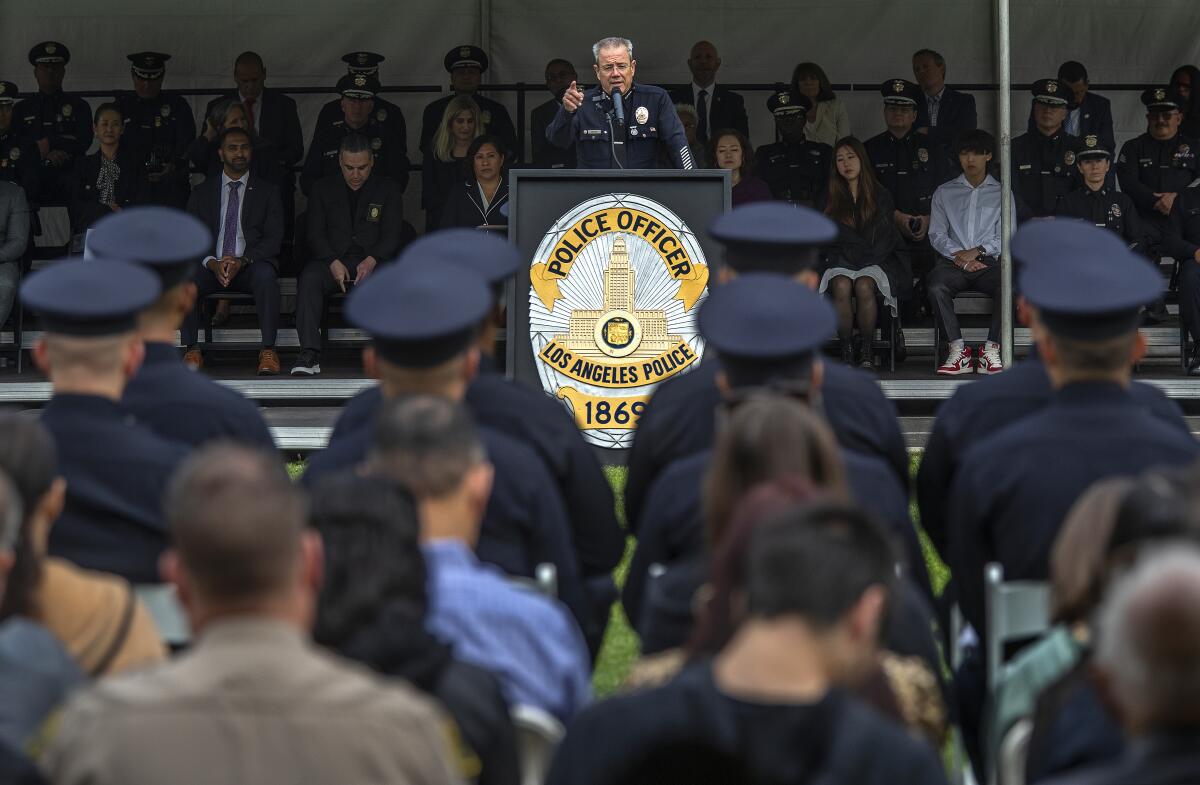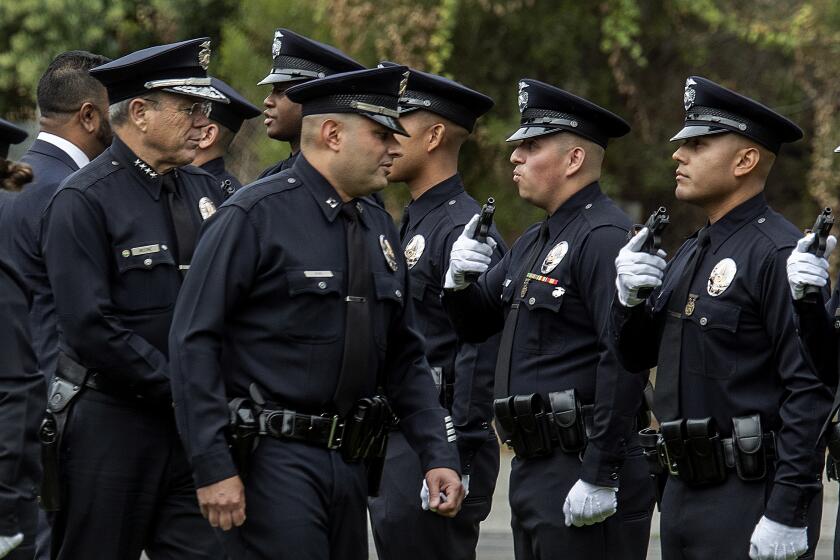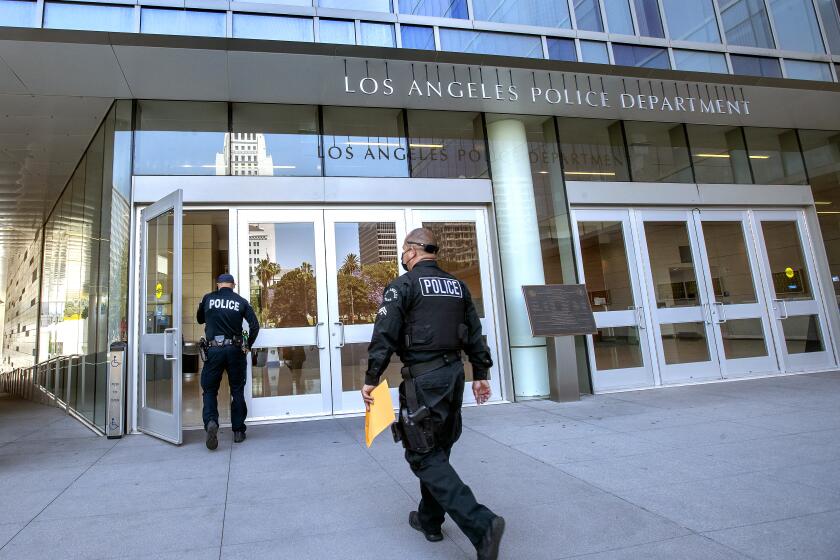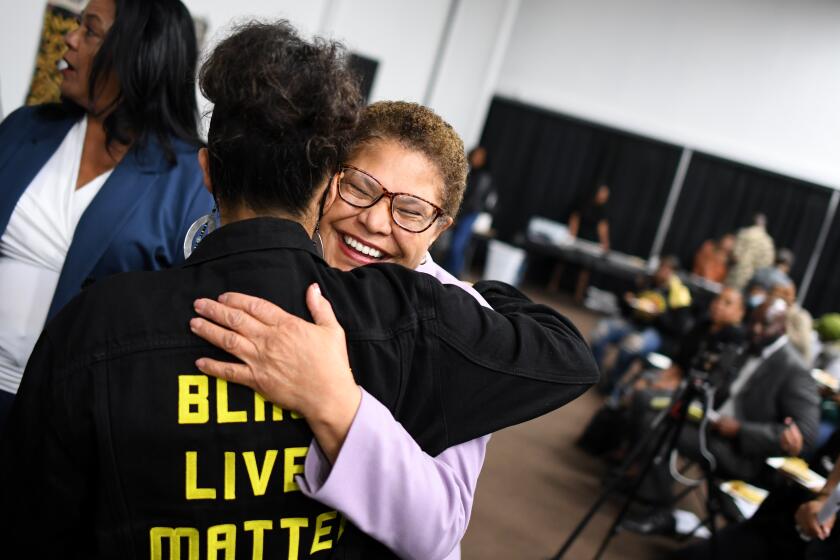Column: What we’ll really get from paying nearly $1 billion more for a new LAPD union contract

How much would you be willing to pay for a security blanket?
$1?
$100?
$100,000?
If you’re most members of the Los Angeles City Council, the answer is apparently about $1 billion.
On Wednesday, they approved a contract with the Los Angeles Police Protective League that will dole out higher starting salaries, bigger pay raises and heftier retention bonuses to the Los Angeles Police Department officers represented by the union.
All told, the four-year contract is expected to increase total police spending to $3.6 billion by 2027, up from the current $3.2 billion.
Three members of the L.A. City Council voted against the agreement, arguing it is too expensive and will pull money away from critical city services.
It’s a lot of money, as Councilmember Bob Blumenfield said before the 12-3 vote. But it’s worth it, so the story goes, because Los Angeles needs more police officers.
Mayor Karen Bass certainly has repeatedly said as much. In fact, she has made it a priority to replenish the ever-shrinking ranks of the LAPD, first by pushing through a $13.1-billion budget that calls for adding about 1,000 officers and now by championing the contract with the police union to provide incentives so officers join the department and stay.
“I want to thank the leaders of the City Council for supporting this action and I look forward to working together to ensure that Angelenos are safe,” Bass said in a statement after Wednesday’s vote.
Not that it took much convincing for some members.
“We want more public safety presence in our communities and on the streets of the Westside,” Councilmember Traci Park said during the meeting. “This contract is necessary to keep the police officers we have and to hire the ones we need. And it’s essential to rebuild the department and to keep our city safe.”
What’s missing in this rush to spend roughly $1 billion more over four years to “keep our city safe” is that, for the most part, our city is already getting safer.
Crime, believe it or not, is on the decline when compared with last year — and it remains nowhere near historical highs.
According to data reported by the LAPD, homicides are down 24% while robberies have declined 13% for the reporting period that ended Aug. 12. Earlier this summer, the department also reported drops in hate crimes and the number of shooting victims.
It’s not just Los Angeles either.
Nationally, homicides have declined about 12% compared with last year, according to a recent report compiling crime data for more than 100 U.S. cities. Robberies and burglaries in many cities are also down in the first half of 2023 compared with the same period of 2022.
All of which suggests that, while police officers play a role in ensuring public safety, their presence is far from the only factor in reducing crime.
Violent crime decreased 10% year over year, with property crime down as well after both rose in 2022.
Not that you would know any of this from watching Wednesday’s chaotic debate among eight Republican presidential hopefuls, as they trashed “hollowed out” Democrat-led cities for “defunding the police” and being violent, lawless, dystopian hellholes filled with fentanyl addicts. Los Angeles even got a shoutout.
Nor would you know that this very real national drop in crime has happened even as police departments have continued to shrink.
After all, it’s not like Los Angeles is the only city that’s losing officers to retirement in droves and having problems with the recruitment of replacements. A similar trend is afoot in many major cities, including New York and Chicago, as well as in several smaller cities closer to home in California.
Councilmember Nithya Raman touched on this Wednesday when she questioned whether paying higher salaries and giving out bigger bonuses would really solve the LAPD’s staffing shortage. Councilmember Hugo Soto-Martínez has asked this as well.
“I think the most honest thing that I’ve heard about why we’re at these LAPD numbers was from an LAPD officer,” he told The Times. “He said to me that ‘Nobody wants to be a police officer because we have an image problem.’”
Not really getting answers, Soto-Martínez, Raman and Councilmember Eunisses Hernandez all voted against approving the contract with the Los Angeles Police Protective League on Wednesday.
At a news conference before the meeting with activists from Black Lives Matter-L.A., Hernandez explained why setting aside so much money in the city’s budget is financially irresponsible.
“Our budget is a zero sum game,” she said. “When we allocate so much of our city dollars to just one department, we starve all of our other departments of the money, personnel and resources that they need to serve Angelenos.”
Soto-Martínez argued on social media that the contract is “doubling down on an expensive, failed status quo.”
Nevertheless, it passed easily. That’s because, while the cold, hard reality of data was on the council members’ side (including the increase in the number of people shot by the LAPD this year), the political narrative wasn’t.
It hasn’t gotten much attention, but L.A.’s new Office of Community Safety could be key overcoming polarization over crime, policing and public safety.
There has long been a disconnect between the facts about crime and what the public believes about crime. People don’t feel safe. They are afraid — something that’s only underscored when there’s a mass shooting at a biker bar in Orange County on an otherwise dull weekday night, even if the alleged shooter is a retired cop.
A recent poll from Public Policy Institute of California found that an “overwhelming majority” of adults in the state believe that violence and street crime are “big” problems or “somewhat” problems in their neighborhoods.
And about half of those polled believe things have gotten worse over the last year — about the same percentage who believe police are doing a good job at reducing crime.
Data be damned.
So while it remains to be seen whether paying officers nearly $1 billion more in raises and bonuses will result in an expansion of the LAPD, one thing is clear. The City Council’s vote to at least try is sure to make a number of Angelenos feel safer.
Like a security blanket. A very expensive security blanket.
More to Read
Sign up for Essential California
The most important California stories and recommendations in your inbox every morning.
You may occasionally receive promotional content from the Los Angeles Times.













